INTERNACIONAL
How Mike Johnson rescued Trump’s tax agenda from jaws of likely defeat
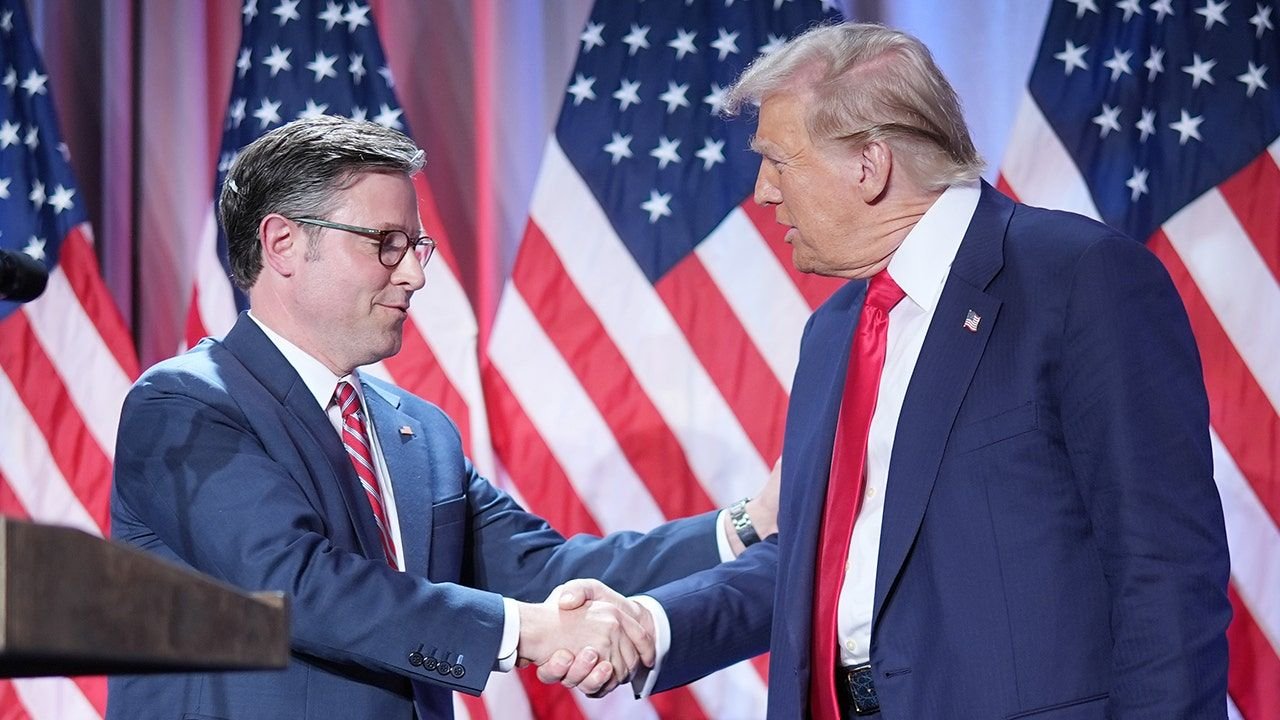
When lawmakers arrived on Capitol Hill last Monday, House GOP leaders’ plans to sync up with the Senate on sweeping legislation to advance President Donald Trump’s agenda seemed an all-but-impossible task.
House fiscal hawks were furious with Senate Republicans for passing an amended version of the former’s budget framework, one that called for a significantly lower amount of mandatory spending cuts than the House’s initial plan.
By late Thursday morning, House Speaker Mike Johnson, R-La., was celebrating victory in front of reporters after a narrow 216-to-214 vote.
«I told you not to doubt us,» a triumphant Johnson told the media. «We’re really grateful to have had the big victory on the floor just now. It was a big one, a very important one.»
HOUSE FREEDOM CAUCUS CHAIR URGES JOHNSON TO CHANGE COURSE ON SENATE VERSION OF TRUMP BUDGET BILL
Speaker of the House Mike Johnson shakes hands with President Donald Trump onstage at a House Republicans Conference meeting at the Hyatt Regency on Capitol Hill on Nov. 13, 2024 in Washington. (Andrew Harnik/Getty Images)
The hard-fought win came after long hours and late nights as House Republican leaders — and leaders in the Senate GOP as well — worked to persuade holdouts, while Trump and his aides worked those same critics from the sidelines.
White House aides were at House Republicans’ weekly conference meeting on Tuesday, a rare sight but not unexpected, given the importance of the coming vote.
But GOP lawmakers filed out of that meeting doubting whether Trump’s influence could help this time, after he played a key role in helping shepherd earlier critical bills across the finish line this year.
«I don’t see it happening,» a House Republican told Fox News Digital when asked whether Trump would be enough to sway critics.
Nevertheless, a select group of those holdouts were summoned to the White House alongside House GOP leaders on Wednesday afternoon, hours before the expected vote.
MEET THE TRUMP-PICKED LAWMAKERS GIVING SPEAKER JOHNSON A FULL HOUSE GOP CONFERENCE
Fox News Digital was told that Trump commanded the room for roughly 20 to 30 minutes, and told House conservatives he agreed with them on the need to significantly slash government spending.
Trump also communicated to holdouts that Senate leaders felt the same, but, like the House, were working on their own tight margins, Fox News Digital was told.
The president, meanwhile, has been concerned in particular with the looming debt limit deadline, Fox News Digital was told.
It’s one of the issues that Republicans are looking to tackle via the budget reconciliation process. By lowering the Senate’s passage threshold from 60 votes to 51, it allows the party controlling the House, Senate and White House to enact broad policy changes via one or two broad pieces of legislation.
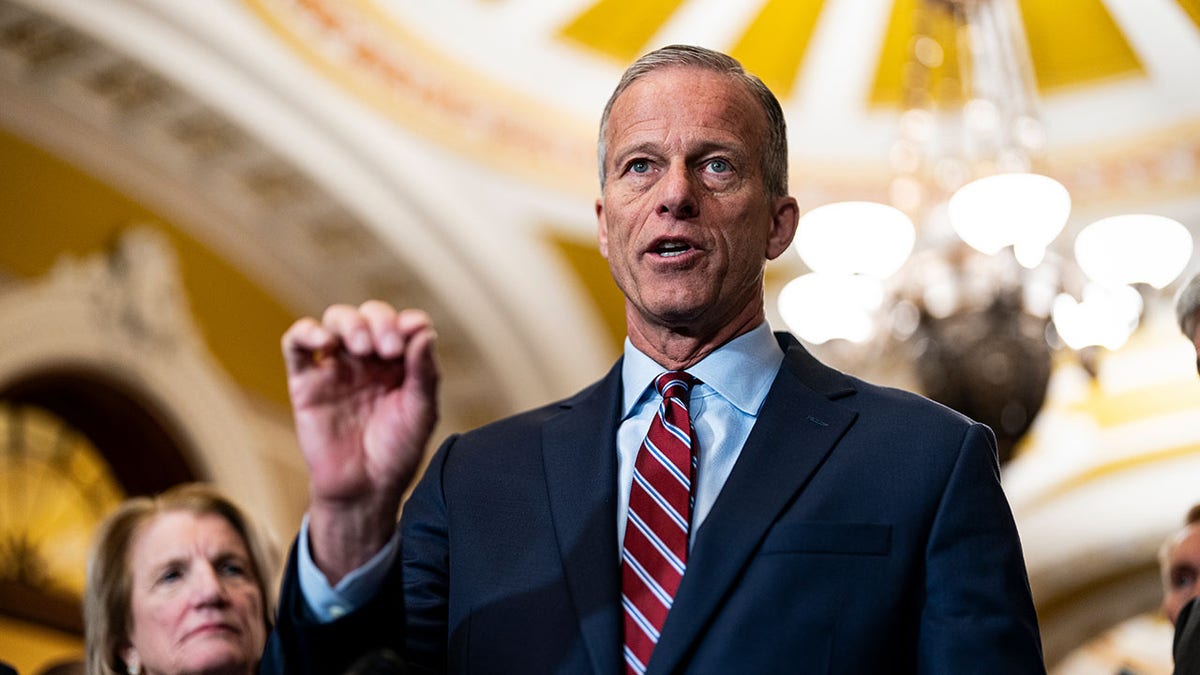
Senate Majority Leader John Thune speaks during a news conference following the Senate Republican policy luncheon at the U.S. Capitol in Washington on Tuesday, March 11, 2025. (Al Drago/Bloomberg via Getty Images)
In this case, Republicans are looking for some added funds for border security and defense and to raise the debt ceiling — while paring back spending on the former Biden administration’s green energy policies and in other sections of the federal government, likely including entitlement programs.
GOP lawmakers are also looking to extend Trump’s 2017 Tax Cuts and Jobs Act, the provisions of which expire at the end of this year. They will also need new funding for Trump’s efforts to eliminate taxes on tipped and overtime wages.
But first, Republicans wanted the House and Senate to pass identical frameworks setting the stage for filling those frameworks with actual legislative policy.
Whereas the House version calls for at least $1.5 trillion in spending cuts, the Senate mandated a floor of $4 billion — a wide gap to bridge.
The Wednesday-afternoon White House meeting did sway some holdouts, but far from enough.
Senate Majority Leader John Thune, R-S.D., also met with House GOP critics of the bill for more than an hour on Wednesday evening ahead of the planned vote.
«He couldn’t have been more cordial and understanding in talking to us about what we needed to know. And honestly, he had some of the same concerns that we did,» Rep. Tim Burchett, R-Tenn., told Fox News Digital.
«You know, he’s got to get it over the finish line, and he had to make certain commitments. But he committed to us to work with us.»
Ultimately, however, plans to advance the measure that evening were hastily scrapped as an unrelated vote was held open for over an hour, leading to confusion and frustration on the House floor.
«He looked like he was in no better spot than he was at the beginning,» one House Republican said of that night.
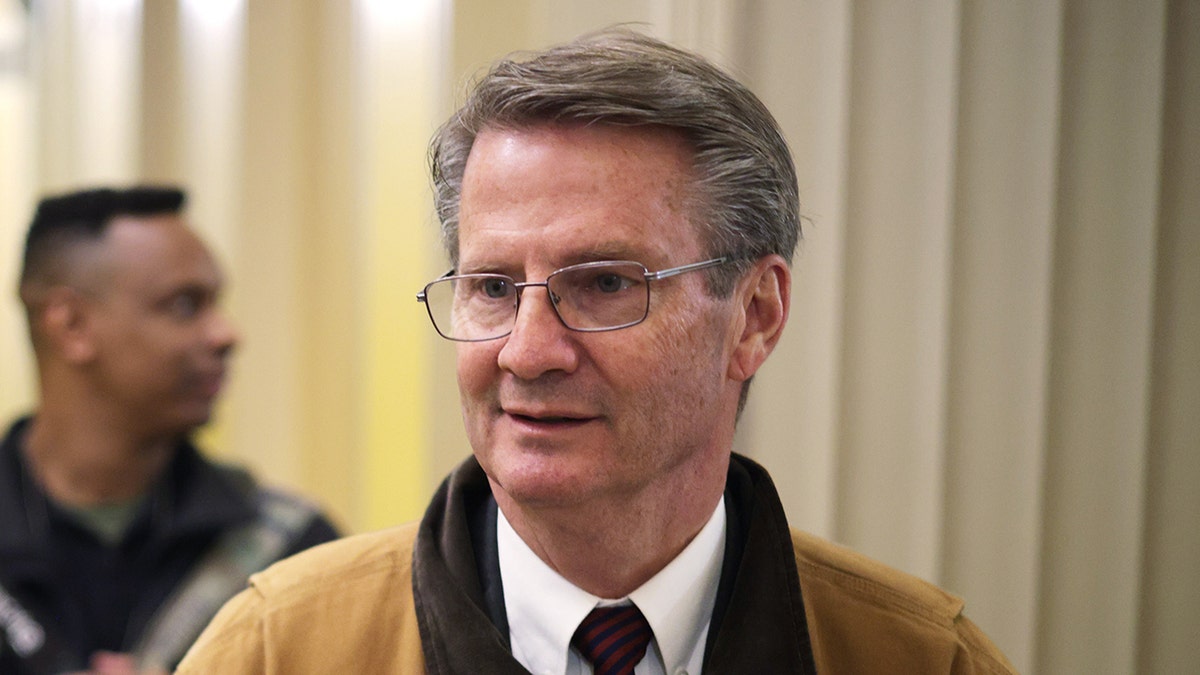
Rep. Tim Burchett speaks with reporters at the U.S. Capitol. (Alex Wong)
Trump was not called to address the group during that huddle with holdouts, two sources in the room told Fox News Digital.
However, the president did have individual conversations with some holdouts on Wednesday and Thursday, one person said.
The Wednesday night failure gave way to a late night of negotiations involving both holdouts and House GOP leaders.
Two House GOP leadership aides told Fox News Digital that Johnson had huddled with Majority Leader Steve Scalise, R-La., and House GOP Conference Chairwoman Lisa McClain, R-Mich., until late Wednesday to figure out a path forward.
When they emerged shortly before midnight, they had settled on a plan — a televised promise by Johnson and Thune to put both leaders on the record committing to deep spending cuts.
SENATE GOP PUSHES TRUMP BUDGET FRAMEWORK THROUGH AFTER MARATHON VOTE SERIES
«I’m happy to tell you that this morning, I believe we have the votes to finally adopt the budget resolution so we can move forward on President Trump’s very important agenda for the American people,» Johnson said.
Thune added, «We are aligned with the House in terms of what their budget resolution outlined in terms of savings. The speaker has talked about $1.5 trillion. We have a lot of United States senators who believe in that as a minimum.»
A senior Senate GOP aide argued to Fox News Digital, «Absent Thune’s intervention, Mike Johnson would not have gotten this resolution through the House.»
But the speaker was also putting in his own long hours with holdouts.
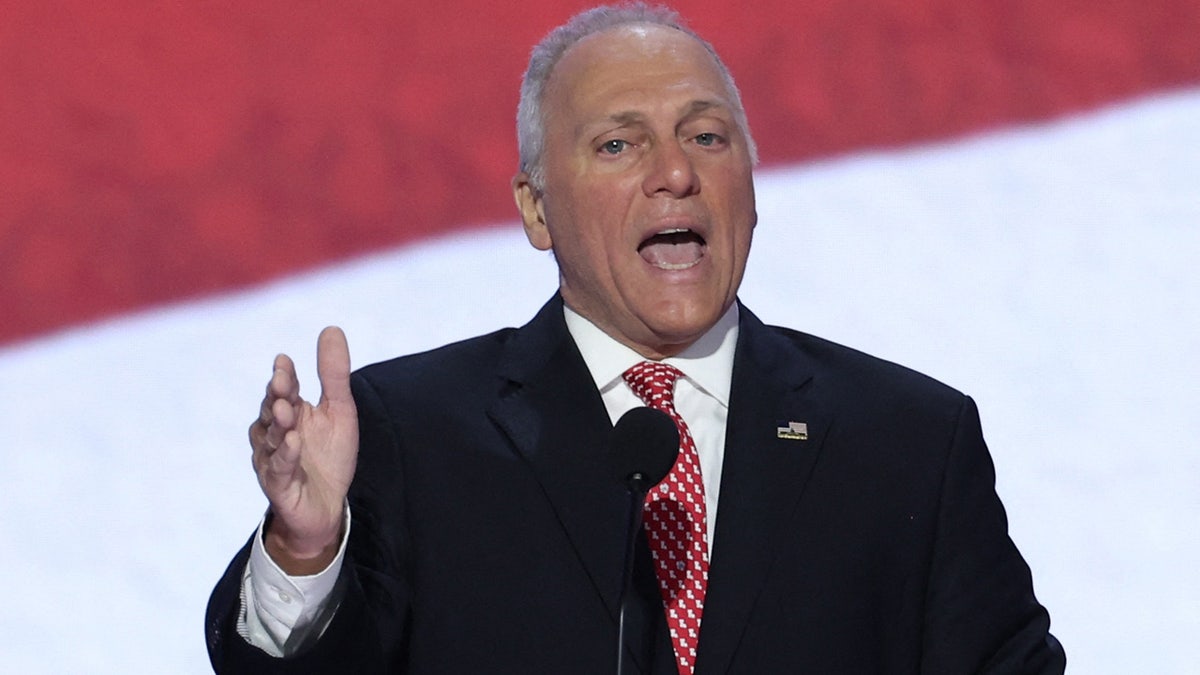
Steve Scalise, House majority leader, speaks during Day 2 of the Republican National Convention (RNC), at the Fiserv Forum in Milwaukee on July 16, 2024. (Reuters/Mike Segar)
The office of Rep. Ralph Norman, R-S.C., who ultimately voted to advance the framework, told Fox News Digital that critics were sent a memo by Johnson early on Thursday, assuring them that he was committed to deep spending cuts.
«The Senate amendment to H. Con. Res. 14 preserves untouched language from the original House-passed resolution, including the reconciliation instructions to House committees and Section 4001 — Adjustment for spending cuts of at least $2 trillion,» the memo said.
It referred to a measure in the House-passed framework that suggested funding toward tax cuts would be reduced by a corresponding amount if final spending cuts did not equal $2 trillion.
«This language reflects a critical principle — that deficit-increasing provisions of the final reconciliation bill are accompanied by concomitant spending cuts,» it said.
Then, as the vote was called around 10:30 a.m. on Thursday morning, a final huddle between holdouts and leaders sealed the Republicans’ victory.
«At some point, it was heated. And then the speaker’s leadership team [House Majority Whip Tom Emmer, R-Minn.] made sure we were clarified on some issues which are very important to some of the members,» Burchett said.
«And then Steve Scalise, really batting cleanup, and he came in with the final with the final conclusion, which everybody agreed to pretty much. And then the speaker closed the deal.»
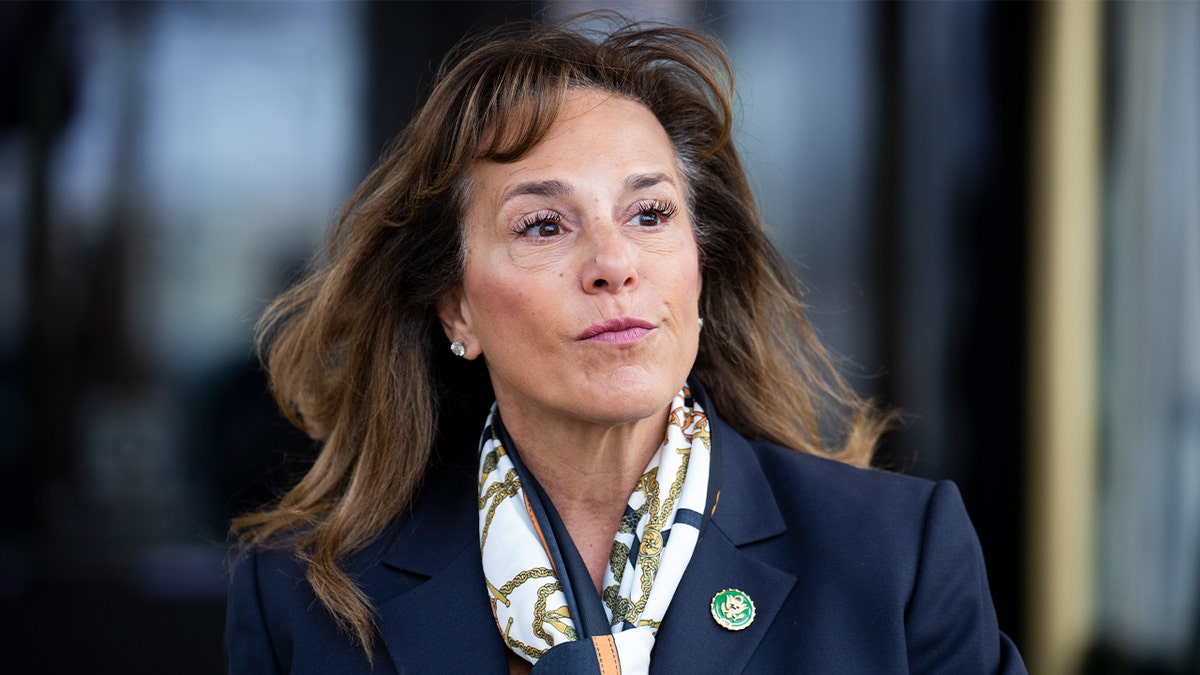
House GOP Conference Chair Lisa McClain leaves a meeting at the Capitol Hill Club on Feb. 28, 2023. (Tom Williams)
Burchett said he believed that Johnson had spoken to Trump separately at some point during that huddle.
A senior House GOP aide said McClain was also present for that meeting.
CLICK HERE TO GET THE FOX NEWS APP
Republicans clinched the win minutes after 11 a.m. on Thursday, with the GOP side of the House chamber erupting in applause.
House Freedom Caucus Chairman Andy Harris, R-Md., who helped lead the opposition, told reporters after the vote, «We made tremendous progress over the last two days in making certain that whatever we do on reconciliation, we don’t increase this country’s budget deficit.»
«We take the Moody report from two weeks ago pretty seriously, that you can’t have unpaid-for tax cuts, and we made progress in making, getting assurances both from the Senate and the House leadership that that’s not going to occur,» Harris said.
House Of Representatives,Mike Johnson,Donald Trump,Politics
INTERNACIONAL
«Derrúmbela», le dijeron, pero él siguió construyendo
INTERNACIONAL
Federal judge blocks Trump administration from defunding some Planned Parenthood facilities

NEWYou can now listen to Fox News articles!
A judge on Monday temporarily blocked the Trump administration from stripping some Medicaid funds from Planned Parenthood after Congress and President Donald Trump agreed to partially defund the nonprofit through passage of the One Big Beautiful Bill Act.
Judge Indira Talwani of the U.S. District Court for the District of Massachusetts said in her order partially granting a preliminary injunction that the bill unconstitutionally punishes Planned Parenthood member organizations that do not provide abortions.
The injunction will risk «at most minimal harm—financial or otherwise» to the Trump administration while the lawsuit proceeds, Talwani, an Obama appointee, wrote.
The judge’s order appears to apply to some but not all Planned Parenthood facilities. The nonprofit said in a statement that it viewed Talwani’s order as a partial win and remained «hopeful» that the judge would take further judicial action down the line.
«This isn’t over,» the organization said. «While we’re grateful that the court recognized the harm caused by this law, we’re disappointed that not all members were granted the necessary relief today.»
SENATE PARLIAMENTARIAN OKS BAN ON PLANNED PARENTHOOD FEDERAL FUNDING IN TRUMP MEGABILL
Pro-life demonstrators gather in front of the Supreme Court building as the Court hears oral arguments over Medina vs Planned Parenthood in Washington D.C. (Kayla Bartkowski/Getty Images)
Talwani’s order arose from a lawsuit brought by Planned Parenthood, the nation’s largest abortion provider, over the One Big Beautiful Bill Act, a massive budget bill that passed Congress this month with no Democrat support. Trump signed the bill into law on July 4.
A provision in the bill stripped Medicaid funding from Planned Parenthood, which the nonprofit said could force it to close about 200 of its 600 facilities and deprive about half of its customers, more than one million people, of services that do not include abortion.
Planned Parenthood attorneys noted in court filings that Medicaid typically does not cover abortion.
JUDGE TORCHED FOR PLANNED PARENTHOOD ORDER: HER COURT LOOKS ‘LIKE A FAST FOOD DRIVE-THRU’

A Planned Parenthood sign (ANGELA WEISS/AFP via Getty Images)
The attorneys argued that the bill would cause cancer and sexually transmitted infections to go undetected, especially for low-income people, and that more unplanned pregnancies would occur because of a lack of contraception access. They said the consequences of losing Medicaid funding «will be grave.»
Department of Justice (DOJ) attorneys had previously argued in court filings that the purpose of the budget provision was to stop «federal subsidies for Big Abortion» by freezing federal funds for certain Medicaid recipients who provide abortions. Weakening Planned Parenthood has been one of the pro-life movement’s leading priorities since the Supreme Court overturned Roe v. Wade.
Talwani granted a temporary restraining order two weeks ago in favor of Planned Parenthood. The judge initially offered no explanation for her decision, a move that led to widespread backlash among Republicans who described it as judicial overreach. Days later, Talwani offered more context in a subsequent order.
PLANNED PARENTHOOD USING ‘LOOPHOLE’ TO GET MINORS GENDER TRANSITIONS WITHOUT PARENTS’ OK: WATCHDOG

Anti-abortion activists march across the National Mall near the U.S. Capitol during the 50th annual March for Life rally on January 20, 2023 in Washington, DC. (Chip Somodevilla/Getty Images)
The preliminary injunction will partially leave in place the pause on defunding Planned Parenthood indefinitely, but the Trump administration is likely to appeal the order to the U.S. Court of Appeals for the First Circuit.
The judge noted that her injunction applied to Planned Parenthood entities that do not provide abortion services or receive less than $800,000 in annual Medicaid reimbursements.
DOJ attorneys had previously argued to the court that blocking a measure that was passed by Congress and signed by the president was an extraordinary move and unjustified.
CLICK HERE TO GET THE FOX NEWS APP
«Beyond the futility of the claims on the merits, Planned Parenthood fails to demonstrate imminent irreparable harm to justify an injunction, asserting only classically reparable economic injury and irrelevant potential harm to patients, who are third parties not before this Court,» DOJ attorneys wrote.
INTERNACIONAL
“La democracia está amenazada”: la advertencia de Boric en una cumbre de mandatarios de izquierda

El presidente de Chile, Gabriel Boric, aseguró este lunes que “la democracia está amenazada y esa amenaza no se reduce solamente a la fuerza militar”, durante la inauguración en Santiago de una cumbre que reúne a sus pares progresistas de España, Brasil, Colombia y Uruguay.
“Hoy, en muchas partes del mundo, la democracia está amenazada y esa amenaza no se reduce solamente a la fuerza militar, como sucedió en América Latina durante la segunda mitad del siglo 20, sino que hay elementos más sutiles que atentan contra ella y que terminan naturalizándose”, indicó Boric al inicio del encuentro bautizado “Democracia Siempre”.
Leé también: Israel lanzó una nueva ofensiva terrestre en Gaza, mientras 25 países pidieron poner fin a la guerra
Entre esos elementos, el mandatario chileno destacó “la desinformación, el extremismo de cualquier signo, el avance del odio, la corrupción, la concentración del poder y una desigualdad que socava la confianza en lo público y el estado de derecho”.
Boric recibió este lunes en el palacio de La Moneda a los jefes de Estado o de Gobierno de España, Pedro Sánchez; Brasil, Luiz Inácio Lula da Silva; Colombia, Gustavo Petro; y Uruguay, Yamandú Orsi, para debatir sobre el avance ultra y los autoritarismos.
Las propuestas que resulten de la cumbre se presentarán en otra reunión que se dará en el marco del 80° período de sesiones de la Asamblea General de Naciones Unidas, prevista para septiembre, en Nueva York.
Gabriel Boric cuestionó el extremismo
En su discurso, Boric afirmó: “Algunos, de diferentes signos políticos, presentan el extremismo y el autoritarismo como una solución eficiente, como si bastara solamente con mano dura o con acallar voces, prohibir el disenso, ridiculizar al adversario como una vía para resolver los problemas de fondo”.
Este camino, añadió, “solo asegura retrocesos, margina las mayorías, impone la ley del más fuerte, amenaza a los más vulnerables y sacrifica la tranquilidad por la incertidumbre”.
Luiz Inacio Lula da Silva y gabriel Boric se saludan en el Palacio de la Moneda, en Santiago (Foto: REUTERS/Pablo Sanhueza)
Boric pidió “identificar esas amenazas y no sencillamente apuntarlas con el dedo” y aseguró que “el objetivo de esta cumbre es remarcar la esperanza y ofrecer una alternativa a esas visiones de mundo”.
Además, anunció que los mandatarios de México, Honduras, Reino Unido, Canadá, Sudáfrica, Dinamarca y Australia decidieron unirse a la alianza internacional en defensa de la democracia.
Lula afirmó que el sistema político cayó en el descrédito
En la cumbre, Lula da Silva dijo que “el sistema político y los partidos cayeron en descrédito”, lo que a su juicio fortaleció a la ultraderecha global.
“En este momento en que el extremismo intenta reeditar prácticas intervencionistas, precisamos actuar juntos”, dijo Lula.
Tras una reunión a puerta cerrada en el palacio de La Moneda, los cinco comparecieron ante la prensa, ocasión en la que Lula denunció que el mundo vive “una nueva ofensiva antidemocrática” que, desde su punto de vista, los Gobiernos progresistas deben enfrentar “con acciones concretas y urgentes”.
A su vez, Petro dijo que el progresismo tiene que “encender la luz cuando las tinieblas llegan y empiezan a atemorizar el alma”.
Leé también: Videos del trágico accidente en Bangladesh: un avión se estrelló contra una escuela y hay al menos 19 muertos
Petro aseguró que durante el encuentro los líderes “profundizaron aún más nuestros acuerdos básicos y no tan básicos que tienen que ver con la crisis climática, la inteligencia artificial, la paz del mundo, rehacer la multilateralidad o defender palabras tan básicas como la libertad y la democracia”.
En tanto, Orsi pidió “aterrizar la propuesta de democracia a cuestiones que los pueblos sientan”.
“En la convicción de poner a la democracia por delante y como centro de la futura discusión, muchos más países se van a unir si el objetivo es fortalecer esta forma de convivencia que tiene de tan lejos y tantas vidas y sacrificios nos ha costado”, afirmó.
(Con información de EFE y AFP)
Progresistas, Lula Da Silva, Gabriel Boric, Gustavo Petro, Yamandú Orsi

 POLITICA2 días ago
POLITICA2 días agoJuan Carlos Maqueda defendió la condena contra Cristina Kirchner: “Hay una sensación de que se hizo Justicia y que no hay impunidad”

 POLITICA1 día ago
POLITICA1 día agoExpulsada del Gobierno, Victoria Villarruel empieza a tomar distancia, pero no tiene proyecto político para este año

 POLITICA1 día ago
POLITICA1 día agoLa CGT evalúa adelantar a octubre el recambio de sus autoridades y define una movilización contra Milei





































